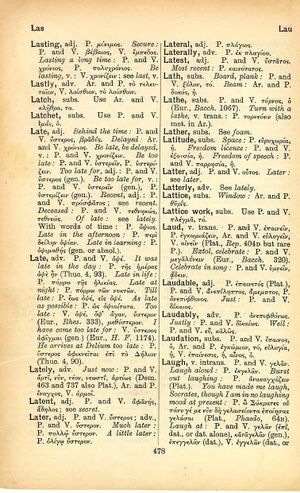laud: Difference between revisions
From LSJ
ἀλλ’ οὔτε πολλὰ τραύματ’ ἐν στέρνοις λαβὼν θνῄσκει τις, εἰ μὴ τέρμα συντρέχοι βίου, οὔτ’ ἐν στέγῃ τις ἥμενος παρ’ ἑστίᾳ φεύγει τι μᾶλλον τὸν πεπρωμένον μόρον → But a man will not die, even though he has been wounded repeatedly in the chest, should the appointed end of his life not have caught up with him; nor can one who sits beside his hearth at home escape his destined death any the more
(Woodhouse 3) |
(CSV4) |
||
| Line 1: | Line 1: | ||
{{ | {{Woodhouse1 | ||
| | |Text=[[File:woodhouse_478.jpg|thumb|link={{filepath:woodhouse_478.jpg}}]]'''v. trans.''' | ||
P. and V. [[ἐπαινέω|ἐπαινεῖν]], P. ἐγκωμιάζειν, Ar. and V. εὐλογεῖν, V. αἰνεῖν (Plat., ''Rep.'' 404D but rare P.). | |||
<b class="b2">Extol, celebrate</b>: P. and V. μεγαλύνειν (Eur., <b class="b2">Bacch.</b> 320). | |||
<b class="b2">Celebrate in song</b>: P. and V. ὑμνεῖν, ᾄδειν. | |||
}} | }} | ||
Revision as of 09:46, 21 July 2017
English > Greek (Woodhouse)
v. trans.
P. and V. ἐπαινεῖν, P. ἐγκωμιάζειν, Ar. and V. εὐλογεῖν, V. αἰνεῖν (Plat., Rep. 404D but rare P.). Extol, celebrate: P. and V. μεγαλύνειν (Eur., Bacch. 320). Celebrate in song: P. and V. ὑμνεῖν, ᾄδειν.

